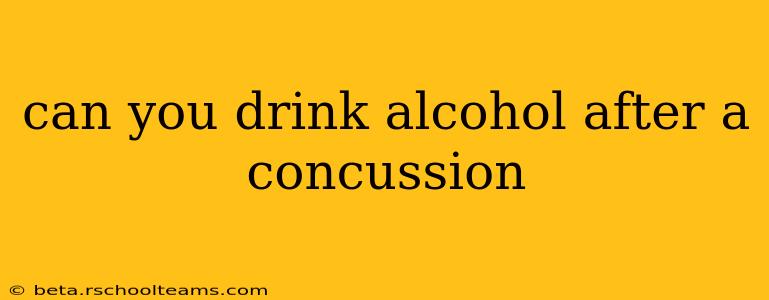Experiencing a concussion can be jarring, leaving you with a range of symptoms and a long road to recovery. One common question many people have is whether they can drink alcohol after suffering a concussion. The simple answer is no, you should absolutely avoid alcohol after a concussion. This is crucial for several reasons, and understanding the risks is paramount to your recovery.
This comprehensive guide will explore why alcohol and concussions are a dangerous combination, addressing common concerns and providing crucial information for anyone dealing with a head injury.
Why Alcohol is Detrimental After a Concussion?
Alcohol acts as a central nervous system depressant. After a concussion, your brain is already vulnerable and undergoing a healing process. Consuming alcohol can interfere with this process in several significant ways:
-
Increased Brain Swelling: Alcohol can exacerbate brain swelling, a common complication of concussions. This swelling can increase intracranial pressure, potentially leading to more severe and long-lasting neurological damage.
-
Delayed Healing: Your brain needs time and optimal conditions to heal. Alcohol disrupts this healing process, potentially prolonging your recovery time and increasing the risk of long-term complications.
-
Increased Risk of Seizures: In some cases, concussions can increase the risk of seizures. Alcohol further elevates this risk, potentially triggering seizures or making existing seizure disorders worse.
-
Masked Symptoms: Alcohol can mask the symptoms of a concussion, making it difficult to accurately assess the severity of your injury and monitor your progress. This can lead to delayed or inadequate treatment.
-
Interaction with Medications: If you're taking prescribed medications for pain or other concussion-related symptoms, alcohol can interact negatively with these medications, potentially leading to dangerous side effects.
-
Impaired Judgment and Increased Risk-Taking: Alcohol impairs judgment and coordination. This is especially dangerous after a concussion, as it can increase the risk of further head injuries or accidents.
What are the Long-Term Effects of Drinking Alcohol After a Concussion?
The long-term effects of consuming alcohol after a concussion can be significant and potentially devastating. These can include:
-
Post-concussion syndrome (PCS): This involves persistent symptoms like headaches, dizziness, memory problems, and cognitive difficulties that can last for weeks, months, or even years. Alcohol can worsen or prolong PCS.
-
Chronic Traumatic Encephalopathy (CTE): While the link between alcohol and CTE isn't fully understood, consuming alcohol after repeated head injuries (including concussions) may contribute to the risk of developing this debilitating neurodegenerative disease.
How Long Should I Avoid Alcohol After a Concussion?
There's no definitive timeline for when you can safely resume alcohol consumption after a concussion. It's crucial to consult with your doctor or healthcare provider. They can assess your specific situation, monitor your recovery, and advise you on when (or if) it's safe to drink alcohol again. Generally, it's recommended to avoid alcohol completely until you have fully recovered from your concussion, which may take several weeks or even months.
What Should I Do If I Have a Concussion?
If you suspect you have a concussion, seek immediate medical attention. A healthcare professional can diagnose the injury, assess its severity, and provide appropriate treatment and guidance for recovery.
Can I Drink Alcohol if I Have Mild Concussion Symptoms?
Even if your symptoms seem mild, it's crucial to avoid alcohol. A mild concussion can still cause significant brain injury, and alcohol can interfere with the healing process.
What Other Substances Should I Avoid After a Concussion?
Beyond alcohol, it's essential to avoid other substances that can affect your brain function, such as illicit drugs and excessive caffeine.
Disclaimer: This information is intended for educational purposes only and should not be considered medical advice. Always consult with a healthcare professional for any health concerns or before making any decisions related to your health or treatment. This article is not a substitute for professional medical advice.
